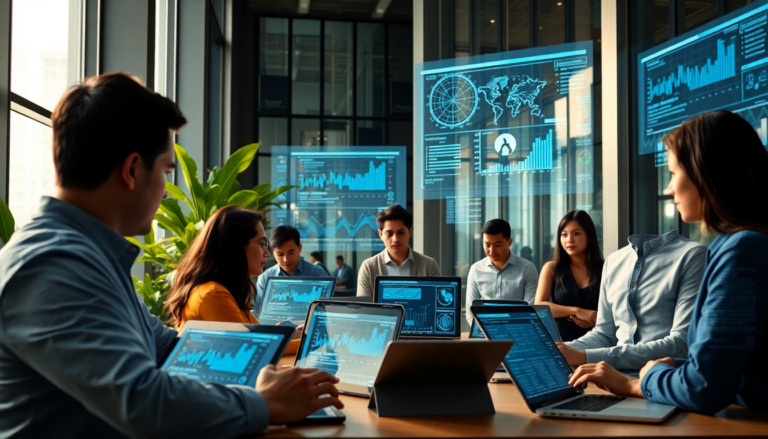Argomenti trattati
The rise of artificial intelligence (AI) is changing the game across various sectors, and its impact on the job market is nothing short of revolutionary. As businesses increasingly adopt AI technologies, the demand for new skill sets is surging, reshaping the landscape of careers. This transformation brings both challenges and exciting opportunities for job seekers and employers alike. So, how exactly is AI influencing employment trends, what new skills are necessary, and what does the future of work look like in this AI-driven economy? Let’s dive in!
The Game-Changer: AI’s Role in the Job Market
AI isn’t just a passing trend; it’s a fundamental shift in how businesses function. From automating everyday tasks to offering advanced data analytics, AI is boosting productivity and efficiency like never before. Recent studies show that companies embracing AI technologies see significant improvements in their performance metrics, which directly impacts their hiring practices. Consequently, the types of available jobs are evolving, with a growing emphasis on roles that demand digital literacy and tech-savviness.
This shift is prompting workers to rethink their skills and competencies. Positions that once depended heavily on manual processes are now increasingly complemented or replaced by AI systems capable of executing tasks with greater accuracy and speed. For instance, customer service roles are undergoing a transformation thanks to chatbots and virtual assistants that handle basic inquiries. This allows human agents to focus on the more complex issues. The integration of AI not only enhances the customer experience but also shifts the skill set needed for success in the industry. Are you ready to adapt?
Equipping Yourself for a New Era
As AI continues to infiltrate various industries, the skills required for many positions are evolving. Employers are now on the lookout for candidates who possess not just technical know-how, but also strong analytical and problem-solving skills. In particular, expertise in machine learning, data analysis, and programming is becoming increasingly valuable, reflecting the shift toward a more tech-centric job market.
But it’s not just about the hard skills. Soft skills like creativity, emotional intelligence, and adaptability are gaining importance too. As AI takes over more routine tasks, the ability to think critically and innovate becomes essential. Workers who can effectively collaborate with AI tools and comprehend their implications will have a significant edge in the job market. Continuous learning and professional development are key to remaining competitive. So, have you considered how to upskill or reskill to meet the new demands of the workforce?
What Lies Ahead: The Future of Work in an AI-Driven Economy
Looking ahead, the job market will likely keep evolving in response to the advancements in AI technology. Experts predict that while some jobs may fade away, new opportunities will arise, especially in areas related to AI development, maintenance, and oversight. Roles such as AI ethicists, data scientists, and machine learning engineers are set to witness significant growth as businesses strive to harness AI responsibly and effectively.
Moreover, the hybrid work model is expected to stick around, thanks to the flexibility that AI tools provide. Companies will continue to explore innovative ways to weave AI into their operations, creating a dynamic work environment that blends in-office collaboration with remote work capabilities. This evolution will require organizations to rethink their strategies for talent acquisition and management. Are they equipped to attract and retain individuals who can thrive in this new landscape?
Ultimately, embracing the changes brought about by AI is crucial for both employers and employees. By fostering a culture of continuous learning and adaptation, businesses can navigate the challenges of an AI-driven market while seizing the opportunities it presents. As we move forward, a proactive approach to workforce development will be essential in shaping a future where humans and AI can coexist harmoniously in the workplace. Are you prepared for the journey ahead?

